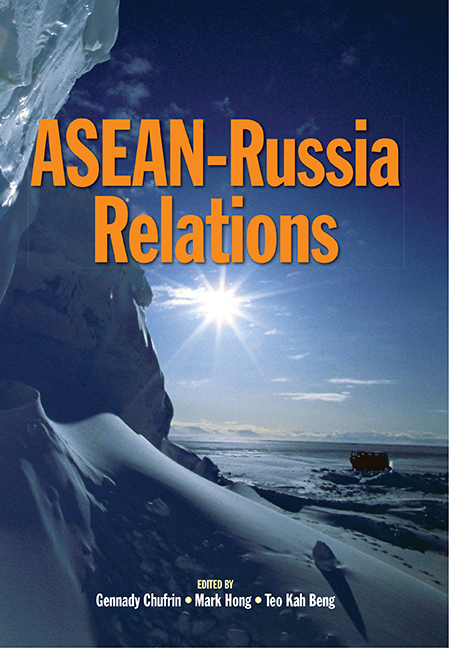Book contents
- Frontmatter
- Contents
- Foreword
- Foreword
- Opening Address
- Opening Address
- The Contributors
- Part I Overview of ASEAN-Russia Relations
- Part II Bilateral Relations
- 3 Malaysia and Russia: Strengthening Strategic Partnership in the 21st Century: A Malaysian Perspective
- 4 Indonesia-Russia Relations: The Jakarta Perspective
- Part III Security Issues in Southeast Asia
- Part IV Bilateral Economic Relations
- Index
3 - Malaysia and Russia: Strengthening Strategic Partnership in the 21st Century: A Malaysian Perspective
from Part II - Bilateral Relations
Published online by Cambridge University Press: 09 November 2017
- Frontmatter
- Contents
- Foreword
- Foreword
- Opening Address
- Opening Address
- The Contributors
- Part I Overview of ASEAN-Russia Relations
- Part II Bilateral Relations
- 3 Malaysia and Russia: Strengthening Strategic Partnership in the 21st Century: A Malaysian Perspective
- 4 Indonesia-Russia Relations: The Jakarta Perspective
- Part III Security Issues in Southeast Asia
- Part IV Bilateral Economic Relations
- Index
Summary
INTRODUCTION: THE TRANSFORMED RELATIONSHIP IN A POST-COLD WAR ENVIRONMENT
For bilateral Malaysia-Russia relations, the decade of the 1990s and beyond has been fundamentally different from the previous era in the light of significant global and regional developments that have occurred since the collapse of the Soviet Union and Empire, and the end of the East-West ideological struggle by 1991. Since then Russia has been transforming its Soviet-era political, economic and military structures to reflect the creation of political democracy and a market economy. The current Russian president, Vladimir Putin, has, since assuming office in 2000, pursued the goal of rapprochement with the West and active participation in the political, economic and security affairs of the Asia-Pacific region including building strong linkages individually and collectively with the ten-member Association of Southeast Asian Nations (ASEAN).
For its part, Malaysia had made rapid strides in industrialization and economic expansion under the visionary leadership of its fourth prime minister, Dr Mahathir Mohamad who held office from 1981–2003. The ASEAN Regional Forum (ARF) became a focal point of activity in regional security matters since its inception in 1993, serving as a critical venue for security dialogues and cooperation to fill the vacuum created by the demise of Cold War power relations. The end of the ideological battle was also marked by the birth of a plethora of new states that were largely constituent elements of the Soviet/Communist empire. Both Malaysia and Russia intend to be active partners in restructuring the regional and world order that has emerged out of the ashes of the Cold War. The Malaysia-Russia relationship is therefore a function of these dramatic developments, as all relationships between nations at the bilateral, regional, or multilateral level are intrinsically connected to systemic change in international relations. It is here that the energies of a dynamically developing Malaysia and a radically transformed Russia could be profitably engaged to give effect and substance to the unfolding new spectrum of bilateral relations.
- Type
- Chapter
- Information
- ASEAN-Russia Relations , pp. 17 - 27Publisher: ISEAS–Yusof Ishak InstitutePrint publication year: 2006

